HSE Is Going Green
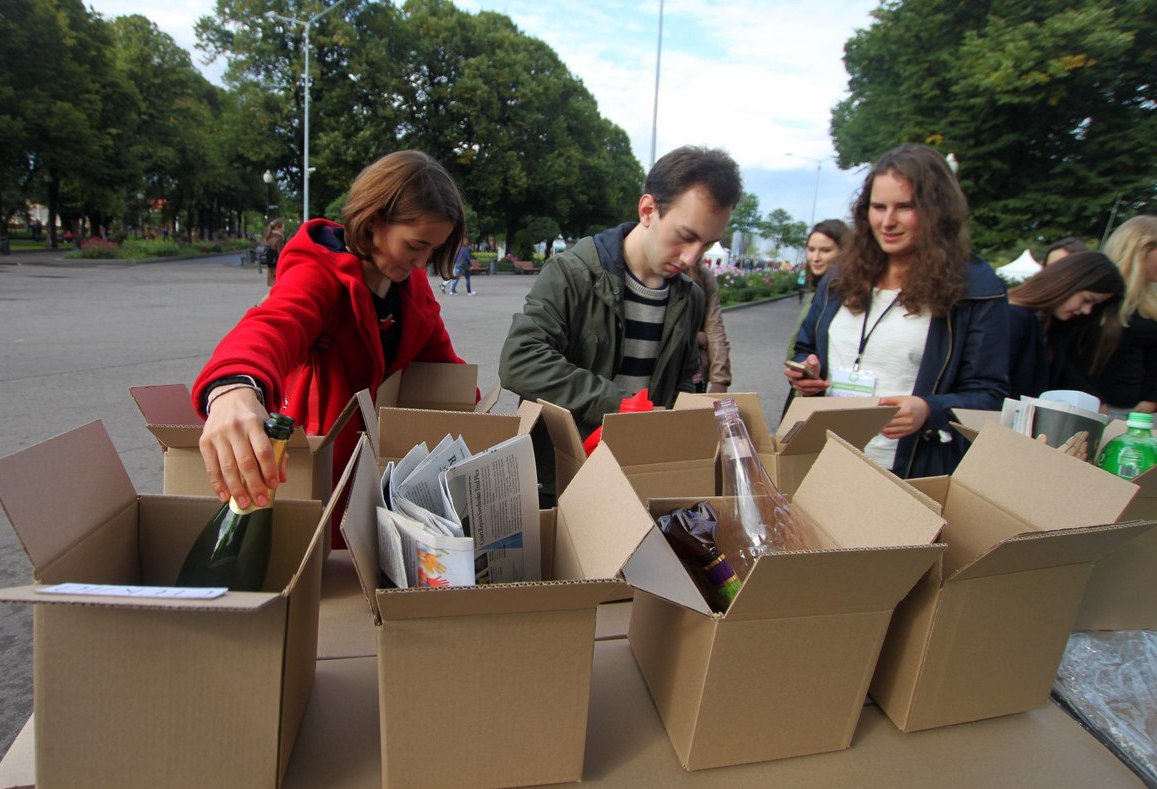 Waste sorting organised by Green HSE on HSE Day 2015
Waste sorting organised by Green HSE on HSE Day 2015
HSE students and faculty now have more opportunities for leading a more ecologically responsible lifestyle right here at the university. Let’s look at how easy it has become for them to do their part.
The university has been becoming greener thanks to the efforts of the university’s administrators and the student organisation Green HSE. Created in 2013 by a group of enthusiasts from what was then called the Faculty of Business Informatics, Green HSE now brings together students from different faculties and years of study.
‘The most important thing is helping people understand that no one is going to worry about the environment for us,’ notes Pavel Musatov, the founder of Green HSE and an HSE alumnus. ‘Every individual can do something to lower their ecological footprint and the harm being done to the environment.’
What can students and faculty of the university do right now to make HSE greener?
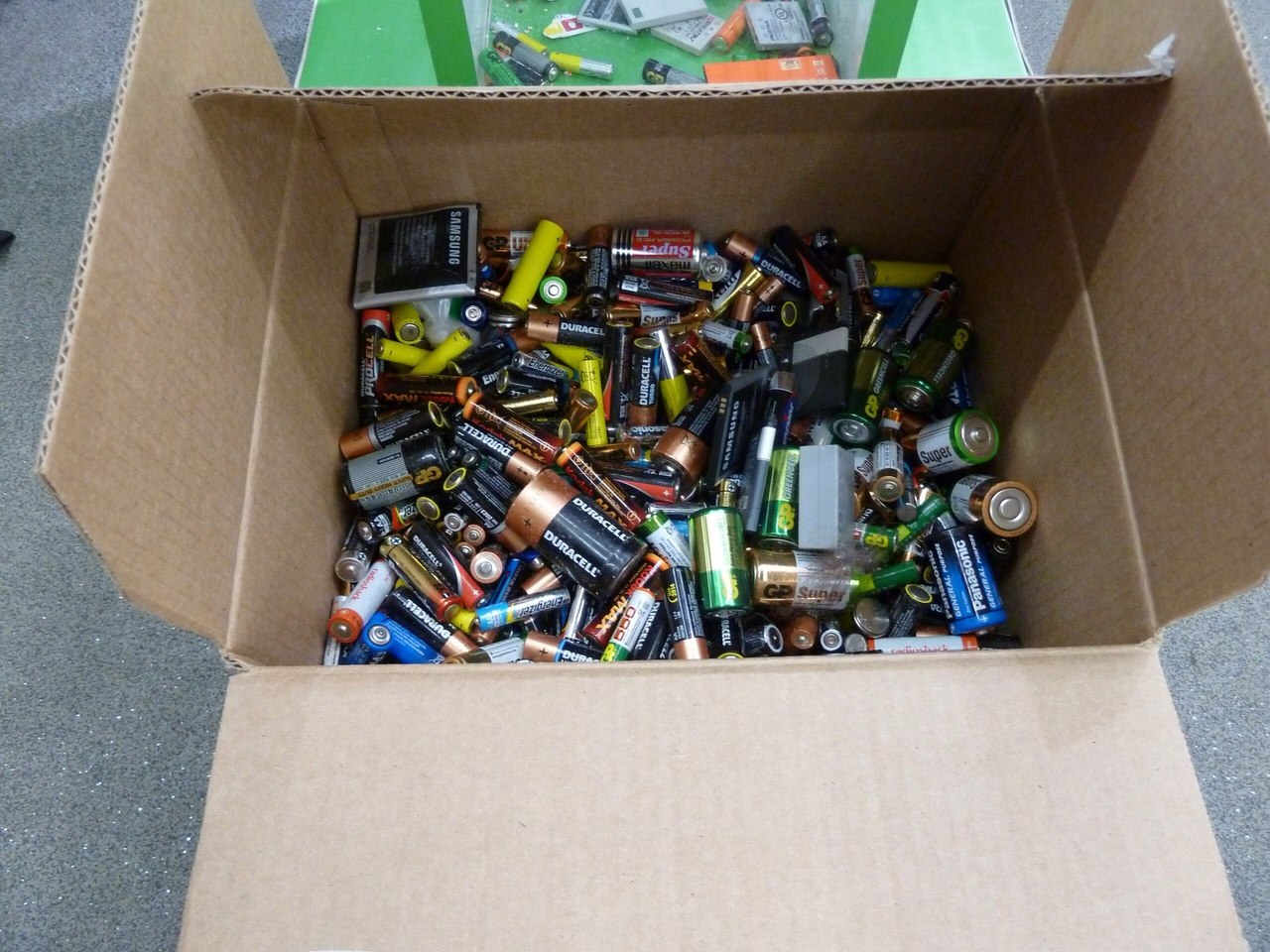
Battery Recycling
Each battery thrown out with your regular garbage pollutes nearly 20 square meters of land, or 400 litres of water, with heavy metals. In order to stop this from happening, it is important to collect all of your batteries together and dispose of them correctly.
Six of the university’s buildings, and three of its dormitories, now have a total of 12 recycling bins for battery disposal. Volunteers keep track of the bins, and one person from each building is responsible for getting rid of the batteries at a proper disposal site. You can find a list of reliable battery disposal points here. Once taken to one of these sites, the batteries are sent to Chelyabinsk to be recycled at the Megapolis Resource plant.
Green HSE volunteers have already disposed of more than 400 kilograms of batteries.
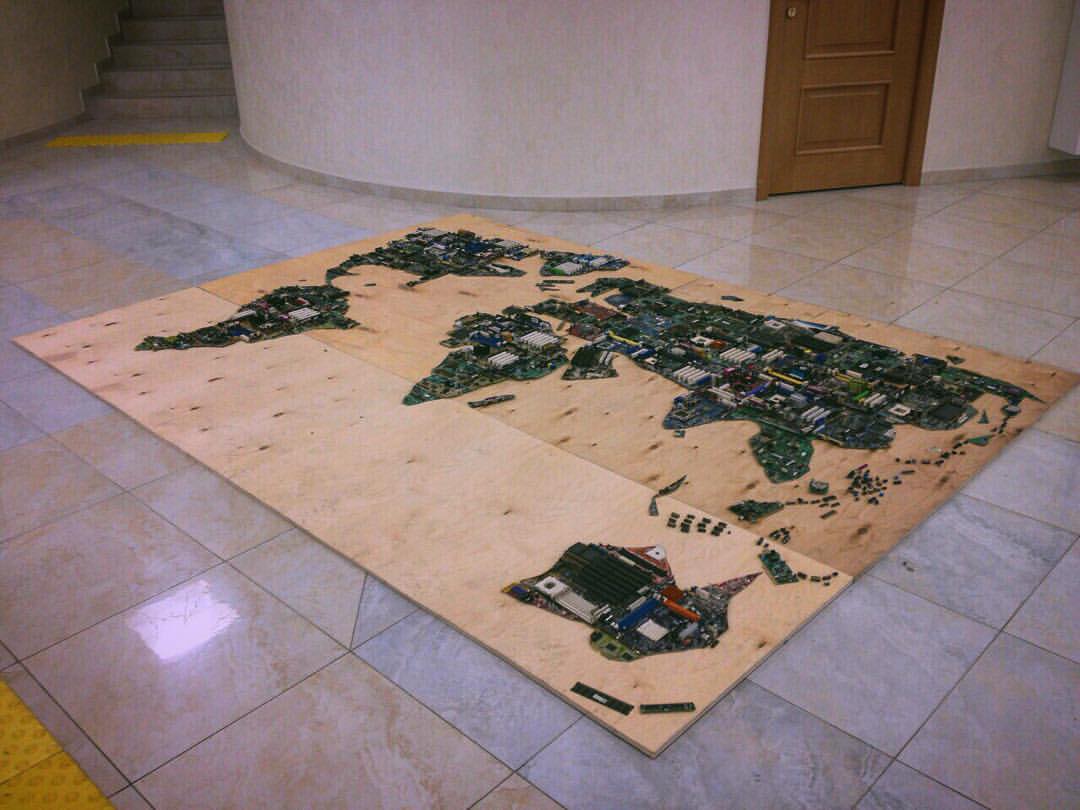 The map of the world from old motherboards created at the marathon of art objects made from electronics
The map of the world from old motherboards created at the marathon of art objects made from electronics
Old Electronics Recycling
Green HSE regularly holds special events to collect old or broken electronics so that volunteers can send them to the Petromax plant in Lobnya, Russia. Green HSE tries to make these events as fun as possible. In November 2015, for example, the organisation held a marathon during which participants created art instillations using old electronics. Green HSE teamed up with the HSE Prototyping Centre to create a robot out of old gadgets, as well as a map of the world from old motherboards.
Overall, more than 150 kilograms of old or unwanted electronics were sent for recycling in 2015.
HSE students and faculty are also able to bring their old electronics to 20 Mayakovskaya St. in Moscow. A container has been placed right next to the box for old batteries in front of the entrance to the cafeteria.
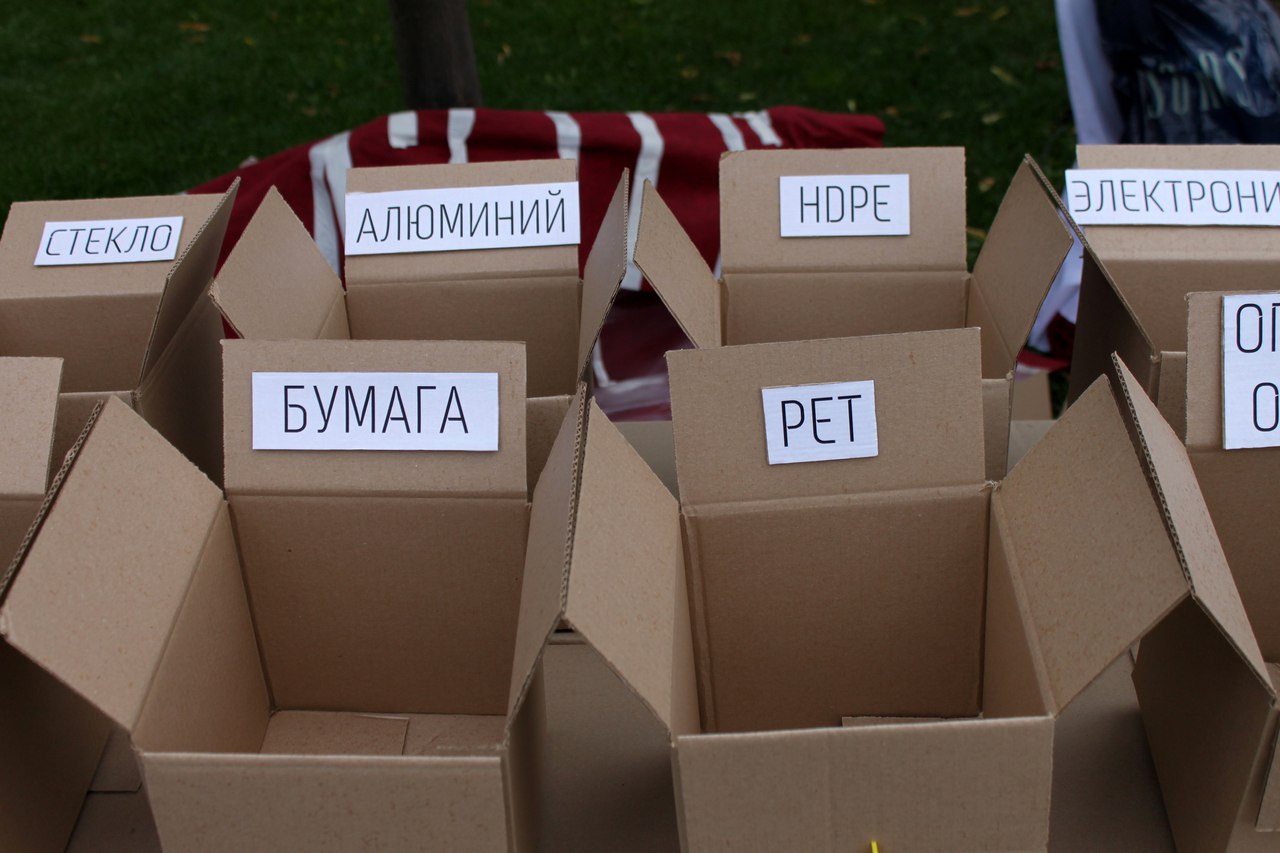
Plastic Collection
In April 2016, HSE installed its first bin for plastic bottles at 33 Kirpichnaya St. So far, 6 kilograms of plastic bottles have been collected, and they will ultimately be sent to the EcoTechnologies plant for recycling. As soon as the university reaches its goal of 18 kg, two more bins will be placed on the building’s other floors.
Paper Recycling
In cooperation with university administrators, Green HSE has set up large paper recycling bins in six of HSE’s buildings and four dormitories. In addition, HSE staff can get in contact with the administrative director of their building to request that someone pick up the paper waste directly from their office.
A map of HSE’s waste collection sites can be found here.
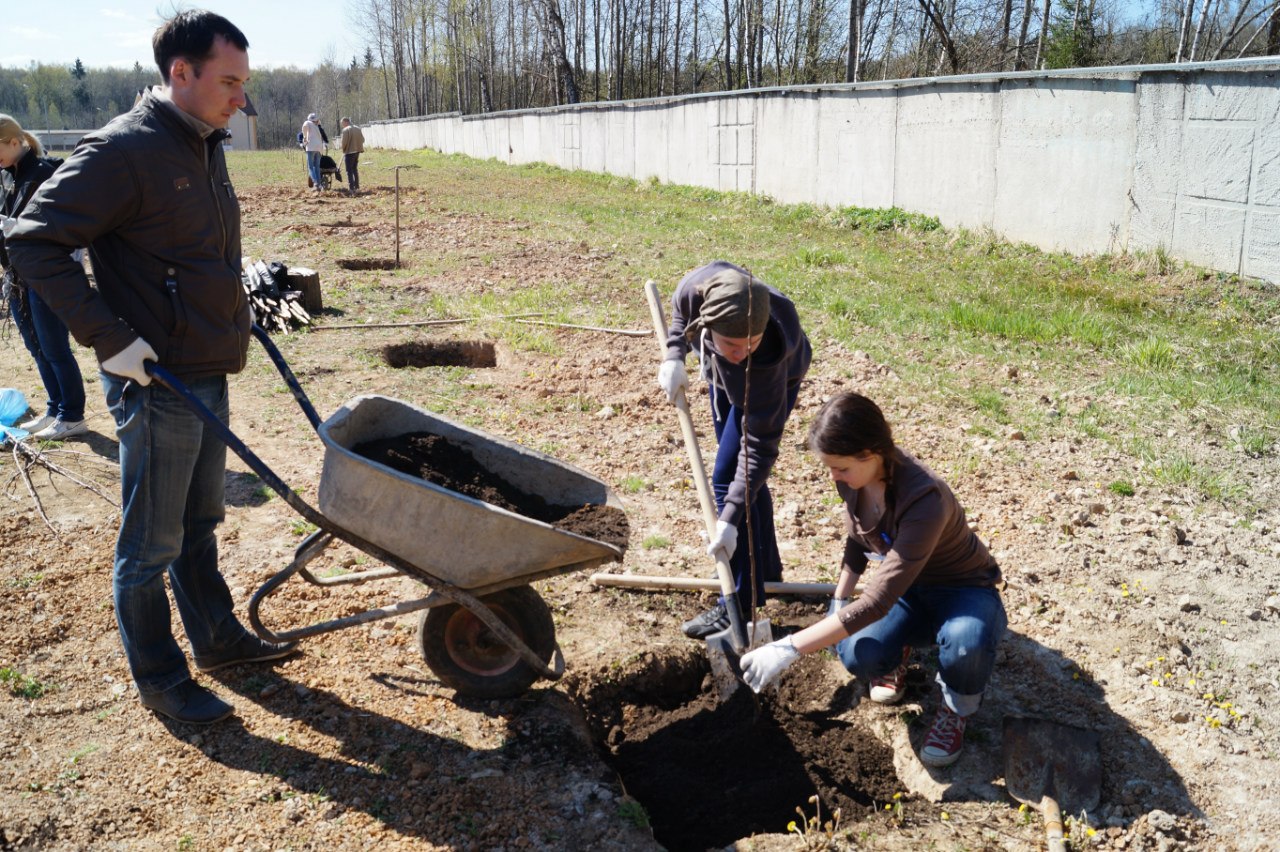
Environmental Campaigns
‘We carry out different environmental campaigns on a regular basis. We plant trees and take part in city- and university-wide ecological events,’ comments Green HSE Director Sofia Malakhova. ‘In 2015, for example, we planted 20 apple and plum trees near the Voronovo [learning centre], as well as around 20 trees and 40 bushes near the neuropsychology building on Taldomskaya St. This was part of the Green Mobilisation event in Moscow.’
On June 4, Green HSE is participating in a travel festival currently being organised by I Like Trip, a travel club for students of HSE and the Moscow Institute of Physics and Technology. At the festival, paper and plastic will be collected, and participants will be able to paint environmentally friendly bags and take part in a waste collection competition.
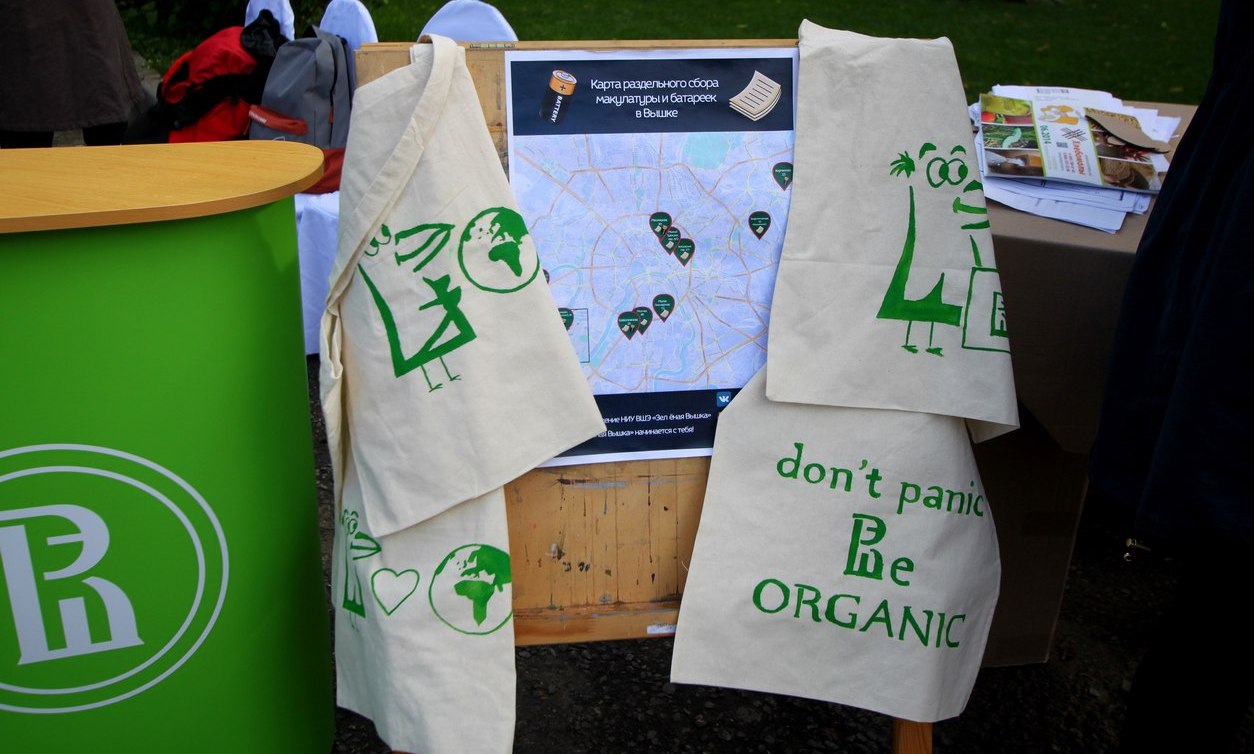
What Else Can You Do?
You can also change some of your everyday household habits. It is really not as hard as it seems, and it’s really effective at helping lower some of the negative effects our daily activities have on the environment.
Photo: vk.com/greenhse
See also:
Green HSE Wins 2020 Moscow Volunteer Competition
The team of Green HSE, an ecological student association, took first place in the category ‘Kind Team. University’, where the largest number of participants (2,025 contestants) took part. Eight volunteer teams from Moscow universities made it to the final round of the competition.
HSE & adidas: Helping Clean the Planet of Plastic
On June 3, a meeting with Chris Thaller, Head of Creative Projects at Runtastic by adidas and founder of the Parley Foundation, who is involved in a project to gather and recycle oceanic plastic, will take place at HSE University.
7.5 m³
of trash was collected by Green HSE volunteers and other environmental activists in the first two weeks of August along the bank of the Moscow Canal in Dubna and in the Moscow park Yauza.
188.8 kg
of clothes have been collected by Green HSE, a student ecological organization, as part of its REwear campaign. All clothes collected will be given to charity shops and organizations, or recycled.
Separate Plastic Collection for Recycling Available at HSE
The environmental student organization Green HSE has launched a service for the separate collection of plastic waste. Special yellow containers can be found across HSE buildings. For now only plastic bottles can be collected for recycling.
Green HSE Сleans up Moscow region’s Lake Relax
Members of the student organisation Green HSE volunteered to clean up nearly 30 meters of lakeshore around Moscow region’s Lake Relax, as well as 60 square meters of the surrounding forest. The volunteers managed to collect more than 50 120-liter bags of trash.
59
applications to beautify and landscape spaces were collected by the mini-park project run by Green HSE, a student environmental club.
Green HSE in Search of Abandoned Mini Park to Clean Up
Green HSE, a student environmental club, is taking part in the upcoming Moscow Flower Show, an international festival of gardens and flowers. As part of the HSE project ‘A University Open to the City’, students will give a presentation on mini parks, the goal of which is to revitalize one of Moscow’s abandoned mini parks or courtyards.
70
trees and shrubs were planted by HSE students and staff as part of the ‘Green mobilization’ campaign.
92 kilograms
of old electronics were collected by volunteers from Green HSE during an eco-event dedicated to World Earth Day.


